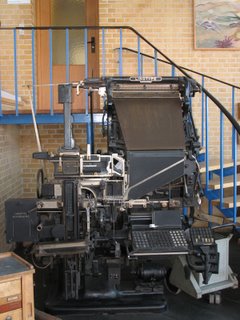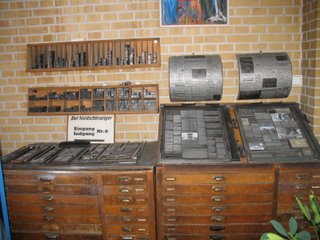A newspaper like none I've ever encountered


Some of the old linotype printing thingamajigs at Der Nordschleswiger
On our study tour to the border region between Germany and Denmark, we visited a German newspaper in Aabenraa, Denmark and heard from its editor-in-chief about some of the history of the German minority there. Of course, when he opened it up for questions, the journalism majors in the room hogged everything and found out more about the newspaper than about the German minority.
What he had to say was really interesting, and reflects some of the differences in European and American media, something I'm learning about in my European News Media in Transition class. (For which I just spent like three hours researching Polish media. I do love that class, though)
Just a warning: this post will probably be really boring to those of you that don't care about newspapers, so you can go ahead and stop reading.
(And to clarify, we heard from Siegfried Matlok, chief editor of Der Nordschleswiger. North Schleswig is the same as South Jutland, so the paper's name is literally The North Schleswiger. )
The newspaper, started in 1946, was a weekly propaganda machine started to make the Germans seem less bad after WWII ended. [Relationships between the Germans and the Danes were very bad during this time: every German man in South Jutland was arrested, many Germans and Danes who sympathized with Hitler or helped the Nazis were killed, Danish women who were in relationships with German soldiers were killed, etc.] But in 1951, it became daily, minus Sunday, and real journalism started happening. Matlok says the paper is well-respected by the Danish media, which often quotes the paper.
With 12,000 subscribers, Der Nordschleswiger could never function how it does now with only revenue from that and ad sales (it is not sold in any stands or anything like that). Luckily, it's funded in part by the German government, and is exploring other options, like syndicating a daily newsletter with German news to over 500 Danish high schools. It also produces a three-times daily radio broadcast in German, but that costs more money than it brings in. 60 percent of funding comes in-house and 40 percent comes from the German government.
What I find significant is the real and honest dedication to news and serving the readership over making money. With every question I asked about the demographics, how the paper was trying to reach youth, if there were strategies for increasing readership, what it was doing with the Internet, I got pretty much the same answer:
They don't care too much, and spend all their time and effort on making good news.
I mean, that flabbergasted me. The readers are mostly over 50 -- and he said himself there's been a trend of too many obituaries in the past three years. But though they don't target youth in any way, the paper is attracting more younger Danes, interested in what the newspaper is writing about. He said they focus on the fundamentals - in-depth, quality journalism that often gives more background info than the profit-driven Danish newspapers can.
The paper is printed in German, obviously, and includes a two-language opinion section, but Matlok says the paper has no plans to go dual-language to increase subscription or anything like that. It isn't going out of its way to attract more Danish readers, it just does what it's been doing and if German-speaking Danes like it, great. (Of course, they would also lose funding from the German government if it was printed in Danish.)
In fact, Danish interest groups indirectly support the paper financially by buying advertising, and their ad revenue has grown 30 percent in the past five years.
And, asked about if the paper has ever censored coverage of the German government because it fears losing funding, Matlok practically scoffed. He said the paper is equally critical of Danish politics and German politics and it doesn't matter what he prints about the government.
Oh, and as far as the Internet goes, yeah it has a Web site, but they only publish some of the stories that run in the paper, and they do nothing as far as trying to push for extra Web content like videos and interactive graphics. There's not even any advertising on the site!
Everything about this is an anomaly to me. Sure, it's a special case, a specialty newspaper with a specific audience, but man, it was really nice to hear. I don't know if maybe we were just getting the idealist bullshit special, but I doubt it because why would he worry about trying to impress 25 American students who were half-asleep anyway? And don't editors love to boast about their readership and what they're doing to increase it? All I know is, this is journalism at its best, at least in principle. I would love so much to work for a publication like this, unencumbered by the stupid media conglomerates and the constant quest for profit that comes from the silly businessmen who don't really care about what they're printing. If there's a newspaper in America with an editor-in-chief saying what Matlok said, I will kill myself working until I can get a job there.

0 Comments:
Post a Comment
<< Home